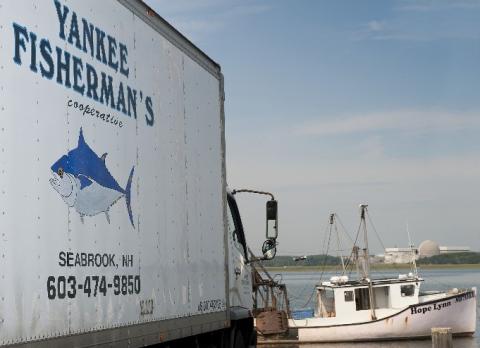Bringing Home the Hake
New Hampshire has a rich tradition of commercial fishing that has undergone multiple transformations over the centuries. In fact, long before Portsmouth and Strawbery Banke were settled by Europeans four hundred years ago, the Abenaki First Nations people settled the land at the mouth of the Piscataqua River to fish and hunt. In other words, fishing has been an important livelihood for coastal communities for as long as humans have settled the region. That is not to say that commercial fishing doesn’t have its challenges. Over the past four centuries, fishing pressure has increased as consumer demand increases and some species were even fished out, as UNH Professor Emeritus, Dr. Jeffrey Bolster, documents in his book, ‘The Mortal Sea’. At present, there is strong hope that the cod fishery will recover from a precipitous decline over the past decade.

While fishing has had its ups and downs, it remains an important part of Seacoast New Hampshire’s economy. Over the past two decades, the number of commercial trawlers that fish for groundfish—bottom fish such as a cod, haddock, pollack, hake, and flounder—has declined from its peak of over 100 boats to just a handful of boats due to declining fish stocks and competition from overseas imports. The boats that remain active have figured out how to remain profitable.
Throughout the pandemic, as supply chains were disrupted, New Hampshire ground fishermen were able to substitute the loss of imported fish with their local catch. Ever entrepreneurial, they figured out how to fill market demand by processing, marketing, and promoting their seafood through local markets, a community supported fishery, and direct-to-consumer sales. More recently, as supply chains begin to strengthen, fishermen have once again turned their attention to wholesale markets. That said, the pandemic showed the resiliency and adaptability of fishermen.
While the groundfish industry has shrunk in terms of catch volume and number of boats, there are other components of the commercial fishery that are doing well. In fact, the lobster industry appears to be breaking records lately, albeit there are concerns about how climate change could push lobster northward in the Gulf of Maine. In New Hampshire, researchers from NH Fish and Game and the Atlantic Offshore Lobstermen’s Association are studying these climate effects on lobsters as part of the national Sea Grant American Lobster Initiative.
Aquaculture is also taking root in New Hampshire, whereby fish are raised in a controlled environment such as in a pen or confined area. Over a dozen oyster farms make their living raising high quality oysters in Great Bay, simultaneously helping to filter the water flowing into the estuary. Also of note, anyone visiting the Seacoast Science Center or Coast Guard facility in New Castle might notice a floating structure a few hundred meters from shore. That structure is a floating Integrated Multi-trophic Aquaculture (IMTA) platform, managed by UNH, designed to raise steelhead trout, kelp, blue mussels, oysters, and scallops. The demand for the quality seafood produced in the aquaculture platform, known as the AquaFort, is so high that it is often sold before it is even harvested. (Local fishermen who participate on the UNH AquaFort project are able to sell the fish and keep the proceeds in return for their involvement.) Contrary to the concerns about aquaculture being unsustainable, the AquaFort demonstration site shows how aquaculture can help remove nutrients like nitrogen from the water, effectively filtering water flowing into and out of the estuary. Furthermore, because the pen-raised fish are all female, there is very little likelihood that the non-native steelhead will escape and breed in coastal waters. The reality is that aquaculture will play an increasing role as long as fish is on the dinner table.
The commercial fishery has always adapted to change and continues to adapt. Fishermen are entrepreneurial and there is a strong emphasis on sustainable fisheries, with NH Sea Grant providing education and technical support to various facets of the industry to help it become sustainable and profitable. That is not to say that the commercial fishing industry is without its challenges, but it will continue to thrive so long as fishermen remain adaptive and focus on sustainable practices. Fishing is a huge part of our state’s economy and our culture.